Part of the MIT Climate Action Plan
MIT Climate Symposia: Symposium Five
The Role of Research Universities and MIT’s Climate Initiatives
October 20, 2020
Chairs: Paula Hammond and Julie Newman, MIT
The fifth of MIT’s six Climate Action Symposia, The Role of Research Universities and MIT’s Climate Initiatives, was held virtually on Tuesday, October 20, 2020. Topics included:
- how research universities can help the world deal with the climate crisis;
- initiatives being developed by MIT to reduce carbon emissions;
- how you can get involved.
Schedule
2:30-2:35 pm
Welcome
Richard Lester, Associate Provost, MIT
2:35-2:40 pm
Setting the stage
Paula Hammond, Head, Department of Chemical Engineering, MIT
Julie Newman, Director of Sustainability and Lecturer, Department of Urban Studies and Planning, MIT
2:40-3:20 pm
Panel I: The role of research universities
Moderator: Paula Hammond, Head, Department of Chemical Engineering, MIT
Speakers:
- Melissa Nobles, Dean of School of Humanities Arts and Social Science, MIT
- John Deutch, Institute Professor Emeritus, Department of Chemistry, MIT
3:20-4:00 pm
Panel II: MIT’s low-carbon campus and test bed
Moderator: Krystyn Van Vliet, Associate Provost; Professor of Materials Science and Engineering and Biological Engineering, MIT
Speakers:
- Joe Higgins, Vice President for Campus Services and Stewardship, MIT
- Julie Newman, Director of Sustainability and Lecturer, Department of Urban Studies and Planning, MIT
4:00-4:30 pm
Reflections on Climate Action at MIT
Maria T. Zuber, E.A. Griswold Professor of Geophysics and Vice President for Research, MIT
Speakers
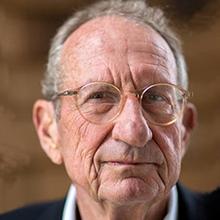
John Deutch is an emeritus Institute Professor at the Massachusetts Institute of Technology. Professor Deutch has been a member of the MIT faculty since 1970, and has served as Chairman of the Department of Chemistry, Dean of Science and Provost. He has published over 140 technical publications in physical chemistry, as well as numerous publications on technology, energy, international security, and public policy issues.
John Deutch has served in significant government and academic posts throughout his career. In May 1995, he was sworn in as Director of Central Intelligence following a unanimous vote in the Senate, and served as DCI until December 1996. In this position, he was head of the Intelligence Community (all foreign intelligence agencies of the United States) and directed the Central Intelligence Agency. From March 1994 to May 1995, he served as the Deputy Secretary of Defense.
From 1977 to 1980, John Deutch served in a number of positions for the U.S. Department of Energy: as Director of Energy Research, Acting Assistant Secretary for Energy Technology, and Undersecretary of the Department.
John Deutch earned a BA in history and economics from Amherst College, and both the BS in chemical engineering and PhD in physical chemistry from MIT. He holds honorary degrees from Amherst College, University of Lowell, and Northeastern University. He has served as director for the following publicly held companies: American Natural Resources, Citigroup, CMS Energy, Cummins Engine, Perkin-Elmer, Raytheon, SAIC, Schlumberger and Cheniere Energy. He is a trustee of Center of American Progress, Resources for the Future, the Massachusetts General Hospital Physician Organization, the Museum of Fine Arts, Boston, and the Skolkovo Institute. He has served on the board of the Urban Institute and the Council on Foreign Relations.

Professor Paula T. Hammond is the David H. Koch Chair Professor of Engineering at the Massachusetts Institute of Technology, and the Head of the Department of Chemical Engineering. She is a member of MIT’s Koch Institute for Integrative Cancer Research, the MIT Energy Initiative, and a founding member of the MIT Institute for Soldier Nanotechnology. The core of her work is the use of electrostatics and other complementary interactions to generate functional materials with highly controlled architecture. Her research in nanomedicine encompasses the development of new biomaterials to enable drug delivery from surfaces with spatio-temporal control. She also investigates novel responsive polymer architectures for targeted nanoparticle drug and gene delivery, and has developed self-assembled materials systems for electrochemical energy devices.
Professor Paula Hammond was elected into the National Academy of Science in 2019, the National Academy of Engineering in 2017, the National Academy of Medicine in 2016, and American Academy of Arts and Sciences in 2013. She is one of only 25 distinguished scientists elected to all three national academies. She won the ACS Award in Applied Polymer Science in 2018, and she is also the recipient of the 2013 AIChE Charles M. A. Stine Award, which is bestowed annually to a leading researcher in recognition of outstanding contributions to the field of materials science and engineering, and the 2014 AIChE Alpha Chi Sigma Award for Chemical Engineering Research. She was selected to receive the Department of Defense Ovarian Cancer Teal Innovator Award in 2013, which supports a single visionary individual from any field principally outside of ovarian cancer to focus his/her creativity, innovation, and leadership on ovarian cancer research.
Professor Hammond has published over 320 papers, and over 20 patent applications. She is the co-founder and member of the Scientific Advisory Board of LayerBio, Inc. and a member of the Scientific Advisory Board of Moderna Therapeutics.
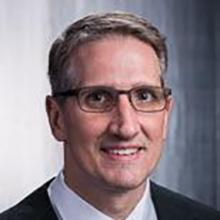
Joe Higgins was appointed vice president for campus services and stewardship on November 1, 2019. In this role, he oversees the Office of Campus Planning; the Office of Sustainability; the Environment, Health, and Safety Office; and the Department of Facilities, including Campus Construction, Campus Services and Maintenance, Facilities Engineering, Utilities, and the Parking & Transportation Office, as well as the administrative functions of the department, including business systems and analytics, communications, finance, information systems, and procurement and vendor management. Higgins and his 800-member team are responsible for designing, constructing, maintaining, and powering the MIT campus while advancing its accessibility, environmental safety, and sustainability.
Higgins joined MIT in 2016 as the Department of Facilities’ director of infrastructure operations, managing critical aspects of MIT’s facilities, including finance and administration, procurement, communications, and customer engagement. In 2018, Higgins was appointed director of campus operations and assumed responsibility for management of campus maintenance, utilities, and facilities engineering.
A registered professional engineer, Higgins holds a BS in engineering and a BA in economics from Swarthmore College, and an MSc in education research from the University of Oxford. Prior to joining MIT, he served for 10 years as vice president and head of engineering for Fidelity Investments, where he also served as Fidelity’s first corporate sustainability officer. Earlier in his career, Higgins held positions for 14 years as director of engineering and then as executive director of strategic and technical services at a Connecticut-based facility management company. In these roles, he provided strategic and engineering services to more than 100 academic and non-profit institutions for their building projects and broader campus initiatives.
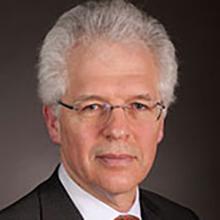
Richard Lester is the Japan Steel Industry Professor and Associate Provost at the Massachusetts Institute of Technology, where he oversees the international activities of the Institute. From 2009 to 2015 he served as head of MIT’s Department of Nuclear Science and Engineering, leading the Department successfully through a period of rapid rebuilding and strategic renewal.
Professor Lester’s research is concerned with innovation strategy and management, with a frequent focus on the energy and manufacturing sectors. He is widely known for his work on local, regional, and national systems of innovation, and he has led major studies of national and regional competitiveness and innovation performance commissioned by governments and industry groups around the world. He is the founding director and faculty chair of the MIT Industrial Performance Center.
Professor Lester is also well known for his teaching and research on nuclear technology innovation, management and control. He has been a long-time advocate of advanced nuclear reactor and fuel cycle technologies to improve the safety and economic performance of nuclear power, and his studies in the field of nuclear waste management helped provide the foundation for new institutional and technological strategies to deal with this longstanding problem.
Professor Lester obtained his undergraduate degree in chemical engineering from Imperial College and earned his PhD in nuclear engineering from MIT. He has been a member of the MIT faculty since 1979. He is an advisor to governments, corporations, foundations and non-profit groups, and he serves as chair of the National Academies’ Board on Science, Technology, and Economic Policy.

Julie Newman joined MIT as the Institute’s first Director of Sustainability in the summer of 2013. She has worked in the field of sustainable development and campus sustainability for twenty years. Her research has focused on the intersection between decision-making processes and organizational behavior in institutionalizing sustainability into higher education.
In 2004, Julie was recruited to be the founding Director of the Office of Sustainability for Yale University. At Yale, Julie held a lecturer appointment with the Yale School of Forestry and Environmental Studies where she taught an undergraduate course entitled, "Sustainability: From theory to practice in institutions". Julie came to Yale from the University of New Hampshire, Office of Sustainability Programs (OSP) where she assisted with the development of the program since its inception in 1997. Prior to her work with the OSP she worked for University Leaders for a Sustainable Future (ULSF). In 2004 Julie co-founded the Northeast Campus Sustainability Consortium, to advance education and action for sustainable development on university campuses in the northeast and maritime region.
Julie lectures and consults for universities both nationally and internationally, participates on a variety of boards and advisory committees and has contributed to a series of edited books and peer reviewed journals. Julie holds a BS in Natural Resource Policy and Management from the University of Michigan; an MS in Environmental Policy and Biology from Tufts University; and a PhD in Natural Resources and Environmental Studies from the University of New Hampshire.
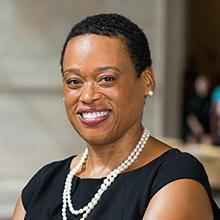
Melissa Nobles is the Kenan Sahin Dean of the School of Humanities, Arts, and Social Sciences, and Professor of Political Science at the Massachusetts Institute of Technology.
Professor Nobles’ research and teaching have focused on the comparative study of racial and ethnic politics, and issues of retrospective justice. Her current research centers on constructing a database of racial killings in the American South, 1930-1954. Working closely as a faculty collaborator and advisory board member of Northeastern Law School's Civil Rights and Restorative Justice law clinic, Nobles has conducted extensive archival research, unearthing understudied and more often, unknown deaths and contributing to legal investigations. She is the author of two books, Shades of Citizenship: Race and the Census in Modern Politics (Stanford University Press, 2000), The Politics of Official Apologies (Cambridge University Press, 2008), and co-editor with Jun-Hyeok Kwak of Inherited Responsibility and Historical Reconciliation in East Asia (Routledge Press, 2013). Her scholarship has also appeared in the Annual Review of Political Science, Daedalus, American Journal of Public Health, and several edited books.
Nobles is a graduate of Brown University where she majored in History. She received her MA and PhD in Political Science from Yale University. Nobles has held fellowships at Boston University's Institute for Race and Social Division and Harvard University's Radcliffe Center for Advanced Study. She has served on the editorial boards of Polity, American Political Science Review, and Perspectives on Politics journals. Nobles has also been involved in faculty governance at MIT and beyond, serving as the Associate Chair of the MIT Faculty from 2007-2009 and Vice-President of the American Political Science Association, 2013-2014.

Krystyn Van Vliet, the Michael (1949) and Sonja Koerner Professor of Materials Science and Engineering and Biological Engineering, has served as MIT's associate provost since 2017. Van Vliet joined the MIT faculty in the Department of Materials Science and Engineering (DMSE) in 2004, and leads the Laboratory for Material Chemomechanics; she received a dual appointment to the Biological Engineering faculty in 2011.
Since September 2019, in her role as associate provost Van Vliet oversees MIT’s Office of Strategic Alliances & Technology Transfer (OSATT). This office includes MIT’s Technology Licensing Office and Corporate Relations, as well as new faculty-centric services to support engagement with corporate and international sponsors of campus research and education programs.
Among other leadership roles at the Institute, Van Vliet directed the DMSE Nanomechanical Technology Laboratory from 2004 to 2012, has co-directed the MIT Biomedical Engineering Minor Program from 2008 to the present, and heads the Singapore-MIT Alliance in Research and Technology (SMART) Critical Analytics for Manufacturing Personalized-Medicine (CAMP) research group, which is developing new technologies to produce cell and gene therapies for patients.
Van Vliet also serves as director of manufacturing innovation within MIT’s Innovation Initiative, a campus-wide program that helps turn research advances and ideas into fully realized technologies. In that role, Van Vliet helped MIT compete in nationwide efforts to launch Manufacturing USA institutes. MIT faculty now participate in 10 such industry-focused institutes, dedicated to development of next-generation manufacturing technologies and workforces for products ranging from wearable microelectronics to biopharmaceuticals.
She has authored or co-authored over 250 papers in peer-reviewed journals, and holds several patents ranging from measurement technology advances to additive manufacturing of biological cell-like materials as novel drug screening platforms.
Van Vliet earned her ScB in materials science and engineering from Brown University in 1998 and her PhD in materials science and engineering from MIT in 2002, prior to postdoctoral research at Boston Children’s Hospital.
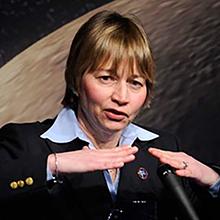
Maria Zuber is the E. A. Griswold Professor of Geophysics and vice president for research at MIT, where she is responsible for research administration and policy. She leads MIT’s Plan for Action on Climate Change.
She oversees MIT Lincoln Laboratory and more than a dozen interdisciplinary research laboratories and centers, including the Koch Institute for Integrative Cancer Research, the MIT Energy Initiative, the MIT Environmental Solutions Initiative, the Plasma Science and Fusion Center, the Research Laboratory of Electronics, the Institute for Soldier Nanotechnologies, Haystack Observatory, and MIT.nano. Vice President Zuber is also responsible for intellectual property and research integrity and compliance, as well as research relationships with the federal government.
Zuber’s research bridges planetary geophysics and the technology of space‐based laser and radio systems. Since 1990, she has held leadership roles associated with scientific experiments or instrumentation on 10 NASA missions, most notably serving as principal investigator of the Gravity Recovery and Interior Laboratory (GRAIL) mission.
Zuber holds a BA from the University of Pennsylvania and an ScM and PhD from Brown. She has won numerous awards, including the James R. Killian Jr. Faculty Achievement Award, the highest honor the MIT faculty bestows to one of its own. She is a member of the National Academy of Sciences and the American Philosophical Society, and is a fellow for the American Academy of Arts and Sciences, the American Association for the Advancement of Science, the Geological Society, and the American Geophysical Union. In 2019, she was awarded the Gerard P. Kuiper Prize, Division for Planetary Sciences of the American Astronomical Society.
Vice President Zuber is the first woman to lead a science department at MIT and the first to lead a NASA planetary mission. In 2004, she served on the President’s Commission on the Implementation of United States Space Exploration Policy. In 2002, Discover magazine named her one of the 50 most important women in science and, in 2008, she was named to the U.S. News & World Report/Harvard Kennedy School list of America’s Best Leaders. In 2013, President Obama appointed her to the National Science Board; she was reappointed by President Trump in 2018. She served as board chair from 2016 to 2018.


